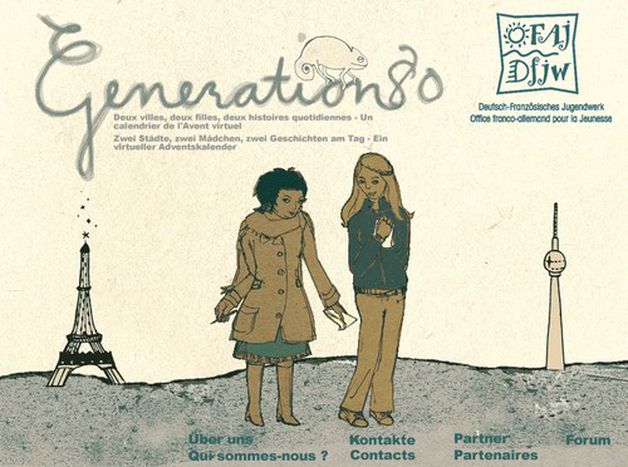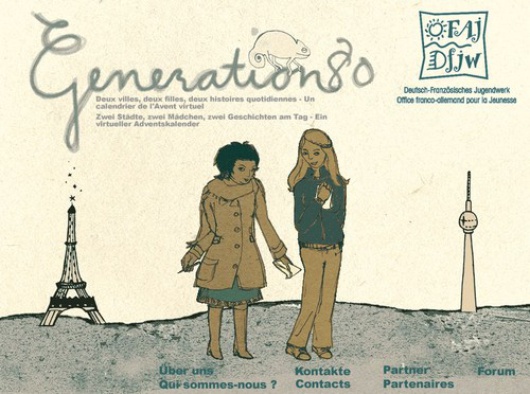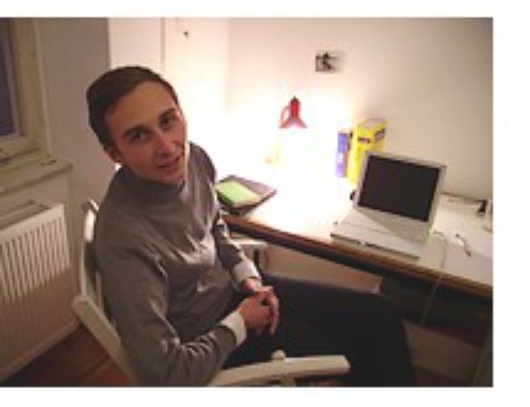
Born in the eighties
Published on
Translation by:
 christopher hall
christopher hall
Twenty-something baby losers. Often disparaged, yet the 'eighties generation' harbour multiple talents. First part of a series of portraits exchanging Paris and Berlin

Eighties generation (blog illustration: © Eva John/ Romy Straßenburg)
Whilst arriving at Franz's house near the Rosa Luxemburg Square in Berlin, I knew only one thing about him: 'he is 24 years old and he wants to become a writer.' I ring his doorbell. A tall, smiling boy welcomes me, dressed in thin black jeans and a vivid grey sweater, with a cup of tea in his hand.
He begins by inviting me on a small tour of his flat which he has just moved into with his girlfriend Johanna. He begins the tour in his office, not without a certain pride. 'It is important that the room where you work is neither the room where you sleep, nor the room where you eat,' he assures me. I have to say that they are rife in Berlin, these three big rooms which would make all the couples in Paris of the same age green with envy. We settle ourselves into the lounge for the interview. As I am putting on the microphone and reminding him about the concept of our blog, I notice two DVDs of the best videos by Michel Gondry and Spike Jonze on the floor.
'A  portrait by day? But I simply couldn't,' exclaims Franz. When he is on the subject of writing, the boy likes to take his time. He needs to feel as if he is in a cocoon, like his beautiful piece of work. It is also for this reason that he has chosen a school unlike any other, the German Institute of Literature in Leipzig.
portrait by day? But I simply couldn't,' exclaims Franz. When he is on the subject of writing, the boy likes to take his time. He needs to feel as if he is in a cocoon, like his beautiful piece of work. It is also for this reason that he has chosen a school unlike any other, the German Institute of Literature in Leipzig.
A 'small villa' of renown, with only sixty students and where some big names in German literature regularly get together. A school where all the students have the same goal: to write a novel, to be published and to be able to make a living from it. 'This is also what I want to do,' states Franz with determination.
To write from the early morning
Being able to express themselves a lot more freely than at university, the students organise themselves as they wish. The professors give them a theme to write about, always quite vast. Each text is read and commented on by the other students: 'It is difficult, but you must learn to accept criticism,' explains Franz.
Since his childhood, Franz has been accustomed to a particularly protective school environment. As a child, he went to Waldorfschule, one of those schools which offers alternative teaching methods. 'Each pupil was encouraged to develop what he / she was best at doing,' he remembers. In his case, he was left in no doubt.
Franz only goes to Leipzig one day a week. The rest of the time, he is in his room in Berlin, sat in front of his Macintosh computer. In order to be able to write effectively, he has put into place a series of rituals: no shower, no breakfast which goes on and on, several hours of non-stop writing in the morning.
The whole world is an idea
Besides his 'school duties', Franz above all writes short stories, sometimes poetry. At the moment, he is drafting his first script for a friend who is a film-maker. As for his first novel, that will certainly be his planned objective once finishing his studies.
Where does he draw his ideas from? 'Everywhere around me! All you have to do is know how to see them! Everything is very interesting, everything is funny, everything is mad, everything is sad. In fact, the whole world is an idea. At times, it gets exhausting from it all,' explains Thomas Bernhardt, Peter Handke, Houellebecq and Proust fan.
Convinced that he will find someone to publish him, Franz knows that the great difficulty is finding a good publisher. Despite the availability of grants for young writers, he knows that the path will not be easy. For him, this is a generation which must grieve for its lost illusions: 'We expected some days without war, with more freedom, less work and less poverty. In fact, we realise that it is exactly the opposite: you have to continuously fight in order to keep what you have. You have to work more, everything is more expensive, resources are running out.'
Finally, he concludes, we are maybe a nostalgic generation. 'Nostalgia about the idea that we were able to shape our own destiny when we were children.'
gen80.eu. A blog devised as a calendar of the virtual advent, dynamic, participative and inevitably Franco-German in order to discover each day. For one month, Eva John and Romy Strassenburg, two young journalists aged 24, exchange their flats and their towns so as to write on a daily basis their life stories, fears, doubts, dreams... that young people their own age have wanted to talk to them about. A project supported by the Franco-German Office For Young People (OFAJ)
Translated from Génération 80 : spleen en slim


